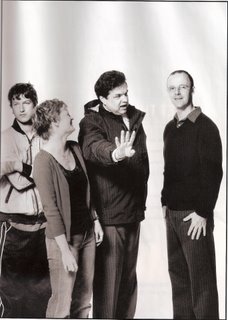
There’s an odd interview with Conor McPherson in Sunday’s New York Times. Or maybe it’s not odd, and it’s just that the American approach to interviewing is very different. McPherson flew to New York early so that he could give this interview, yet the writer, Jason Zinoman, quotes him only a handful of times (eight short quotes in a 1200 word pieces), opting instead to ruminate at length about the playwright’s near-fatal battle with alcoholism (he collapsed at the opening of Port Authority in 2001, and was subsequently unconscious for three weeks with a dangerously inflamed pancreas), and about the place of alcohol in his plays. I’m not saying that this isn’t interesting, and McPherson is willing to talk openly about it, but it’s such a bloody predictable approach. Finishing up, of course, with the obligatory meditation on the centrality of drink in Irish culture. Again, I’m not saying this shouldn’t be there, but there was room in a piece of this length to explore, in more depth, other aspects of McPherson’s playwriting practice and of the creation of Shining City. Like, for example, the fact that it came largely out of his own experience in therapy following his breakdown. There’s a mention of how dysfunctional and crazy therapists are, but I would have liked to read a little more about the creation of a play out of that situation. Also, is it just me or is there something drearily voyeuristic about the way that Zinoman goes to Neil Jordan for a quote about how drunk McPherson used to get and how much he used to drink by himself? And getting the “things are better now” quote from McPherson’s wife; if the rest of the interview was sufficiently probing and revealing of its subject, this sort of padding would not be needed, because the reader would know that McPherson drank too much, and that he’s more balanced and happy now. In fact, the little that Zinoman gives us of McPherson’s own words already shows this, so why the other quotes? I think it’s mere gimmickry. John Lahr of the New Yorker often talks to the family and friends of his subjects when he’s writing his long profiles, but there’s never a sense of redundancy or of going over already-covered ground with those quotes. Everything has its place, and what’s built up as a result is a full and far-reaching portrait. I think the NYT has merely glossed over McPherson. He’s been sober for 5 years, so why a whole article about his drinking? (Not to mention his “kinky red hair”…spare us.)
Speaking of the New Yorker, Hilton Als gives Shining City a pretty brisk seeing-to in his review. It’s not entirely at the other end of the spectrum to Ben Brantley’s NYT gushfest, (“in terms of construction…as close to perfection as contemporary playwriting gets”) but it’s certainly not a glowing response. Why he feels the need to devote a long paragraph at the beginning of the review to an utterly unrelated actor and director, Charles Laughton - best known as Quasimodo in the 1939 film The Hunchback of Notre Dame – absolutely baffles me; if he wanted to discuss Oliver Platt’s distinctive “way of moving through space”, why not get straight to it? (I’m not convinced that Platt was that comfortable in the role anyway; I think his onstage awkwardness might have stemmed from a genuine discomfort with the role of an Irishman.)
Als praises all four actors, and his point that listening, much of which is required of this cast, is one of the hardest things for an actor to perform, is a very good one. But I can’t agree with his argument that O’Byrne’s role is technically the most difficult because he must “hold up a mirror to two confused souls without conveying his own character’s confusion in their presence.” Our gradual realisation of Ian’s confusion and internal chaos is essential, and O’Byrne must guide us towards that realisation in the scenes he shares with the other actors. Which I think he does without difficulty, yet Als maintains that he (Als) didn’t intuit that confusion until near the end. Maybe he was too distracted by Platt’s “poncho” (it’s a windcheater, for Christ’s sake…)?! Oh, ok, that’s just petty. I usually like Als’s criticism a lot, and I agree with his final analysis of the play, that it comes across “as an undeveloped first draft”. And I agree that the actors, most of them, turn in strong performances, but I see their strengths in different places. I certainly can’t share Als’s adoration of Oliver Platt, and I think that Peter Scanavino deserved more credit than he was given in this review (in fact, he was not even mentioned…was his accent too strong?) Great photo, though, by Steve Pyke (above).
Monday, May 15, 2006
On Pints and Ponchos: Shining City in the New York Press
Subscribe to:
Post Comments (Atom)

4 comments:
I saw the production in Dublin and for the life of me I don't know what the fuss is about. Apart from Stanley Townsend's amazing performance of that central monologue I thought the characters were really poorly drawn. As a therapist I found the portrayal of the therapist character insulting as well.
It's so depressing to see all the usual clichés trotted out by the media over there...maybe they're being sponsored by the Irish Vintners?
Hi! Just want to say what a nice site. Bye, see you soon.
»
Super color scheme, I like it! Keep up the good work. Thanks for sharing this wonderful site with us.
»
Interesting site. Useful information. Bookmarked.
»
Post a Comment